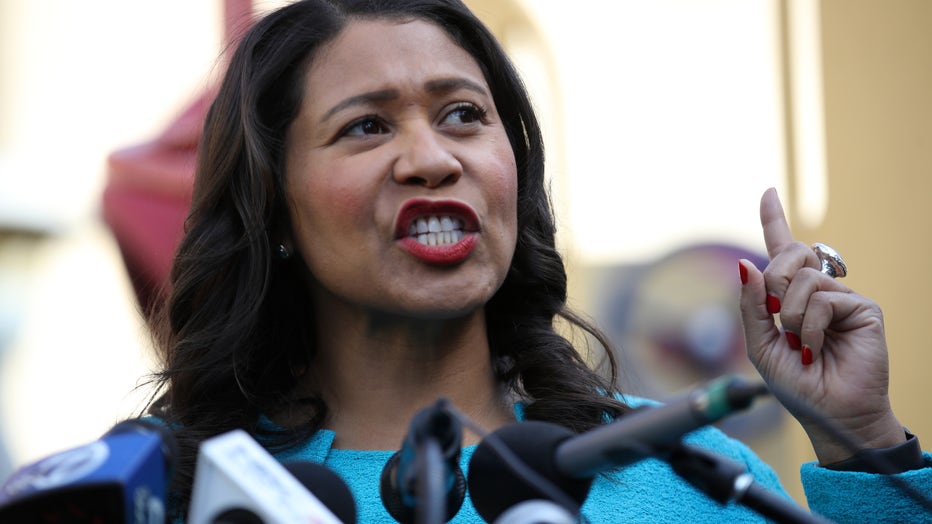San Francisco mayor closes playgrounds, health officer warns worst yet to come

San Francisco mayor closes playgrounds, health officer warns worst yet to come
San Francisco Mayor London Breed announced the closure of city playgrounds on Monday to increase social distancing measures. In addition, the city's public health director said he expects a hospital surge of COVID-19 patients within the next two weeks.

San Francisco mayor London Breed speaks during a press conference on November 21, 2019. (Getty Images)
SAN FRANCISCO - San Francisco Mayor London Breed confirmed there are 131 positive cases of COVID-19 in the city as of Monday. She also announced city playgrounds would be closed as a result of residents not adhering to social distancing guidelines public health-officials have ordered.
The mayor said that sadly, officials are receiving information that people are still heading to public parks and beaches. Breed said this is not a snow day, nor a time for a party or a playdate. "We need people to comply."
In her impassioned plea, Breed said the last thing she wanted to do was to close parks, but that she would do so if necessary. In a subsequent news conference, Governor Gavin Newsom announced he was shutting down all state park parking lots to discourage crowded trails and parks.
Residents have been sheltered in place for seven days due to the pandemic. While they are allowed to go out for essentials, people are asked to maintain six-feet of social distance. However, some have been congregating in public spaces.
Breed framed it as a matter of life and death and said more people will get sick.
"The folks that are out on the streets having drinking parties, the folks that are out on the streets socializing and coming together and not taking this social distancing requirement seriously, you are putting public health in jeopardy," the mayor said.
In Monday's virtual video news conference, the mayor was joined by San Francisco Director of Public Health Dr. Grant Colfax. He gave a sobering warning, based on data, that expects to see a surge of patients in the next week or two at San Francisco hospitals due to an increase in cases related to the outbreak. The worst is yet to come," Colfax said.
The San Francisco Department of Public Health is working with epidemiologists from UCSF and UC Berkeley to try to anticipate when that surge will come and just how much social distancing is impacting the expected influx of patients.
The city is in the process of negotiating for more than 8,000 hotel rooms in the city for quarantine space. That number matches the 8,000 people who are homeless and living on the city's streets, according the the city's data.
The goal of procuring these hotel rooms is to provide isolation space for those who cannot self isolate, such as those living in single room occupancy (SRO), communal living situations where kitchens and bathrooms are shared. Priority is also given to front-line medical workers and first responders who may need those hotel beds in order to not spread disease to their loved ones or those they may be living with.
Members of the Board of Supervisors are planning to introduce a resolution Tuesday urging the city to house the city's homeless in hotels as well. Those supervisors said with an estimated 30,000 vacant rooms, there is more than enough space to protect the unsheltered.
However, protocol from the Centers for Disease Control and Prevention says while social distancing among the homeless population should be practiced, those living in encampments should not be brought inside.
"The status quo is completely unacceptable, it's unhealthy, it's dangerous," said Supervisor Matt Haney who represents the Tenderloin and SoMa neighborhoods. "Every second, every minute that we leave the status quo, that we leave thousands of people on the streets, thousands more in unsafe shelters, we are making it more likely that this virus spreads."
Director of SF Human Services Agency Trent Rohrer said at this point San Francisco is following CDC guidelines, which advises against mass relocations of the homeless population.
The mayor said the city has received shipments of personal protective equipment for medical workers, including donations from the private sector. Facebook has donated 100,000 N95 masks.
In addition, Mayor Breed made a direct plea for any businesses that are capable of manufacturing or performing services that are vital, to fight the COVID-19 pandemic and to repurpose their businesses to help their community.

